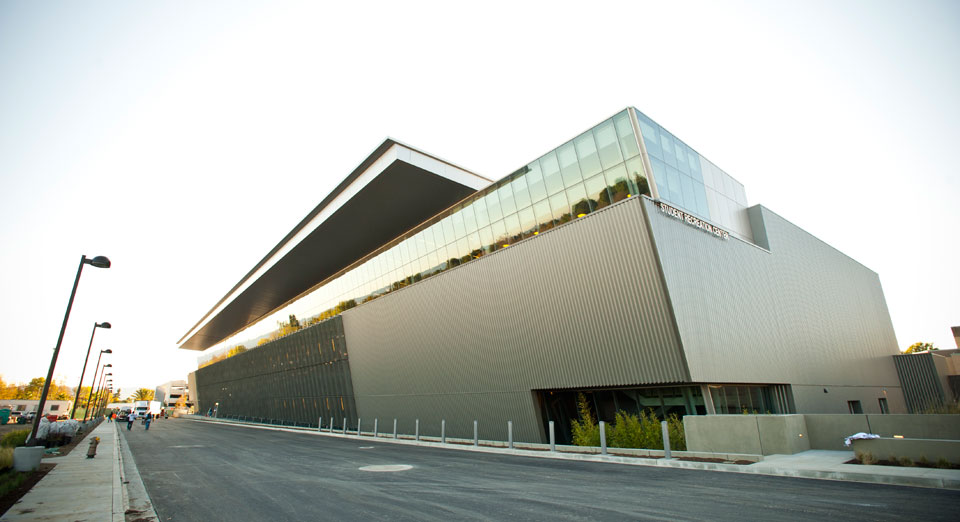President Harrison Joins Climate Leadership Summit
California State University, Northridge President Dianne F. Harrison will be in Boston Oct. 1-3 for the 2014 Presidential Summit on Climate Leadership. The summit will bring together more than 250 college and university leaders from across the United States to focus on ways to strengthen campus climate action and sustainability initiatives, as well as higher education’s leadership role in developing strategic responses to climate and sustainability challenges in community, regional and national contexts. Like President Harrison, most summit participants are signatories of the American College & University Presidents’ Climate Commitment (ACUPCC).
Convened by Second Nature, Inc., the supporting organization for the ACUPCC, the summit reflects the centrality of higher education’s role in preparing new generations to meet the challenges of climate change. The program focuses on ways to build on the success of climate action plans and sustainability initiatives on ACUPCC campuses and to develop solutions to the most pressing environmental problems facing our communities.
More than 680 colleges and universities in the United States are current ACUPCC signatories, representing all 50 states, the District of Columbia, and every category of public and private higher education institution. These signatories are committed to achieving carbon neutrality and represent more than 6.5 million students – one-third of all college students in the nation.
“The summit provides an important venue for leaders in higher education to come together and exchange ideas for tackling climate change and building resilience against it,” said geography professor Helen Cox, director of CSUN’s Institute for Sustainability. “Coinciding with the 2014 U.N. Climate Summit, at which leaders from around the world came together to build a framework for reducing greenhouse gas emissions, participation in this event demonstrates leadership and commitment from within higher education, and an understanding of the importance of education in tackling climate change and its devastating impacts.”
The Second Nature summit was designed by a group of 30 college and university presidents with the support of a committee of seven local institutions, and is organized into five tracks: Knowledge and Solutions for a Changing Climate, Higher Education’s Climate Leadership Imperative, Creating a Campus Culture of Sustainability, Investment Strategies and Institutional Risks and Corporate Partnerships for Climate Leadership – along with a session on the Alliance for Resilient Campuses, Second Nature’s newest initiative focused on climate resilience.
Highlights include keynote addresses by Brian Swett, chief of environment and energy for the city of Boston, and Kate Gordon, executive director of The Risky Business Project. Kathy Jacobs, director of the Center for Climate Change Adaptation Science and Solutions and former director of the U.S. National Climate Assessment, is speaking about and facilitating discussions about climate resilience throughout the event.
CO2 impact from attendee travel, meeting space and guest accommodations is being offset through purchase by The Revere Hotel of carbon offsets from Native Energy, Inc. Summit sponsors include Xerox, Cenergistic, Altenex and ecoAmerica. For more information about the summit, visit http://www.secondnature.org/resources/summit-2014.
About CSUN: Serving more than 40,000 students each year, CSUN is one of the largest universities in the United States. CSUN ranks 10th in the country in awarding bachelor’s degrees to underrepresented minority students, fifth nationally in awarding master’s degrees to Hispanic students and enrolls the largest number of deaf and hard-of-hearing students of any U.S. state university. CSUN’s 171 academic programs and engaged centers enjoy international recognition for excellence. CSUN currently partners with more than 100 institutions of higher education in 22 countries around the globe and attracts the largest international student population of any U.S. master’s level institution. Situated on a 356-acre park-like setting in the heart of Los Angeles’ San Fernando Valley, the campus features modern educational buildings and world-class LEED Gold-certified performing arts and recreational facilities recognized as among the best in the country. CSUN is a welcoming university that champions accessibility, academic excellence and student success.
About Second Nature: Second Nature works to create a healthy, just and sustainable society beginning with the transformation of higher education. It is the supporting organization of the American College & University Presidents’ Climate Commitment (ACUPCC), an intensive partnership among more than 680 higher education institutions committed to climate neutrality. ACUPCC institutions work to accelerate education, research and community engagement to equip society to re-stabilize the earth’s climate while setting an example by eliminating greenhouse gas emissions from their own operations.
Learn more at www.secondnature.org and www.presidentsclimatecommitment.org.




 experience
experience